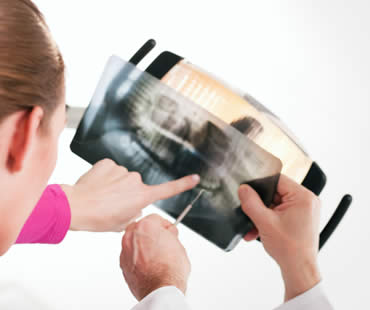
If your teen is scheduled to have wisdom teeth extraction surgery, you might be feeling stressed-out about the procedure and how you can best prepare for what’s to come. Surgery can be frightening. As the adult, it’s your role to get the information you need and to educate and calm your teen so that you both have a feeling of confidence and safety during all steps of the oral surgery.
Don’t mislead your teen about the procedure or recovery time. Talk about the reasons the wisdom teeth need to be extracted; be honest about the issues. Talk about the oral surgeon and his or her qualifications and why this particular surgeon was chosen. Help give your teen a sense of trust in the surgeon, to help calm his or her nerves.
Listen to everything your child has to say regarding the surgery. Validate all your child’s feelings and statements and offer any guidance you can from your own life’s experiences. Be open to allowing a conversation between the surgeon and your teen. Your oral surgeon has experience in dealing with fearful patients and can often remedy fearful thoughts and feelings more efficiently than a parent.
Reassure your child that you won’t be far away during or after the procedure. Even though your teen may be already in college, surgical procedures can be frightening and you might be surprised at how much your teen may lean on you, emotionally and physically during this time.
Answer any of your child’s questions honestly. Go over any parts of the surgery that are confusing to your teen. This knowledge can restore a sense of control to the patient, and allow the patient to feel prepared to recover.
Your teen’s oral maxillofacial surgeon wants your teen to be comfortable during the surgery. Sedation dentistry options may be offered as early as the night before, so that the patient can be well-rested and calm for the procedure.
We look forward to seeing you in our Haymarket dental office

Does your child need braces, but isn’t sure about being a “metal mouth” for two or more years? Did your teen come to you and beg for some other option to traditional braces? Perhaps you’ve heard about Invisalign aligners but are wondering if they’ll work for your child. Invisalign is absolutely appropriate for your teen if all of his or her baby teeth have fallen out and adult teeth have erupted.
Invisalign provides the same results as traditional metal braces, but without the metal brackets. Concerns over eating with braces are removed with the Invisalign trays, as they come out for meals, leaving your teen free to eat any food he or she desires.
Invisalign utilizes clear plastic trays that allow the process of straightening your teen’s teeth to be less obvious and less obtrusive. Beginning with x-rays and molds, your orthodontist will make a series of trays, called aligners. These trays are worn most of the day, taken out only to eat or to be cleaned. The process of straightening happens gradually and comfortably.
It is essential during this time that the trays are worn as recommended by the orthodontist. Wearing them less than the recommended amount of time will result in slower correction, and has the potential to lengthen treatment. Have your teen continue with any established good oral hygiene habits. Brushing and flossing must continue on a regular basis, brushing twice a day at minimum and flossing before bedtime.
Being a teenager is full of difficulties, and it is during this time that teens are at their most self-conscious. Adding metal braces to this transition can make everything worse for your child, leaving him or her self-conscious about eating with friends or smiling, talking or laughing in public. Your teen’s gapped, misaligned or crowded teeth can be improved significantly with Invisalign trays. Talk to your orthodontist today to see how Invisalign can make a difference for your child.
We look forward to seeing you in our Haymarket dental office

If you are either planning to undergo cosmetic dental procedures or necessary treatments for dental problems, there is a case to be made for considering sedation dentistry. Sedation dentistry refers to the use of medications in varying forms to calm and relax you prior to and during a dental procedure. Just a few reasons to consider dental sedation include:
- Dental sedation can be used for essentially all regular dental procedures. Under sedation, your dentist can accomplish far more in one appointment, meaning less overall time for you in the dental chair. Procedures that may normally take 2 or 3 visits to the dentist can be completed all in one visit with the help of dental sedation.
- Normally, dentists do not like to work on both sides of the mouth at the same time as this requires anesthesia to each side and could cause the patient to bite their tongue. Sedation dentistry allows your dentist to work on both sides of the mouth in one sitting.
- Dental sedation allows you to feel relaxed and free from stress while the actual procedure is being performed. In many cases, even though you are still conscious, you will not remember any of the actual time you spent in the dentist chair.
With sedation dentistry, there is no need to dread dental treatments and procedures. Your fears and anxiety should not deter you from seeking the cosmetic or restorative dental care that you desire. Consult with your dental professional about the options offered for sedation, and schedule your oral care with the confidence that you will have a calm and pleasant experience while improving your smile.
If you need a dentist in Haymarket contact us today

Kids will be kids, and emergencies happen that can affect the mouth. To avoid long-term damage, extensive pain, or unsightly results, it’s important to know what to do in a dental emergency. Let’s learn what you should do when your child has one of the following common oral problems.
Severe toothache:
Look for food stuck between the teeth, and if so try to dislodge it with floss. Clean the affected tooth and rinse the mouth well with warm water. Swollen gums may indicate an infection, which requires a dental visit. Facial swelling can be relieved with cold compresses, but if it accompanies severe pain you should take your child to the dentist or emergency room. Try giving over-the-counter pain reliever, but don’t place the medication directly on the gum or tooth.
Chipped tooth:
If your child chips a tooth, contact your dentist immediately. Fast action can help save the tooth, reduce the risk of infection, and prevent extensive procedures. Have your child rinse with cold water. If you can find the tooth fragment, take it to the dentist in case it can be bonded back in place.
Knocked out tooth:
The first thing to do is locate the missing tooth. Hold it by the crown instead of the root, and rinse it gently. Try replacing the tooth back in the socket, and have your child bite a piece of gauze or cloth to hold it in place until you get to the dentist. If you can’t insert it, place it in a cup of cold milk to take with you. Time is important in saving a displaced tooth, so see your child’s dentist immediately.
Cut lip, tongue, or cheek:
Ensure your child’s teeth are undamaged, and apply firm pressure with a moist washcloth or teabag to the bleeding area. If it doesn’t stop in fifteen minutes, call your child’s dentist or head to the emergency room. If the tongue is bleeding, there’s not much you can do except wait to see if it stops bleeding on its own within fifteen minutes. If not, visit the dentist or emergency room.
We treat patients from Haymarket and the surrounding area

You’re not the only one if you feel like your smile has become dull and yellowed. This happens to nearly everyone, and it is the most common complaint that people have about the look of their smiles. There is no reason to live with a discolored smile. Teeth whitening is available to restore your pearly whites.
There are a number of reasons that your smile has changed over the years. Aging causes tooth enamel to thin and allow the yellow-tinged dentin layer to show through. Dark-colored foods and drinks stain teeth, some medications produce the side effect of darkening teeth, and tobacco use creates difficult stains. Teeth may also change color due to mouth trauma.
Whatever the culprit is for your diminished smile, teeth whitening is a simple way to restore it. Whitening products contain bleaching agents that break up stains so that the color is less concentrated and your teeth look brighter. However, teeth whitening does not work in all situations. It does not affect restorations like veneers, fillings or crowns. Whitening is also not usually effective on stains resulting from injury or medications. Yellow teeth are the most likely to respond to teeth whitening, while brown or gray tones might be less improved.
There are numerous options for teeth whitening. Home products are available at your local drugstore like whitening toothpastes, gels, pens, strips and more. These methods focus on removing surface stains from your teeth. At-home bleaching kits are another option, typically obtained from your dentist, that involve filling a mouth tray with a special bleaching solution and wearing the trays for a time period like overnight. These kits are stronger than over-the-counter methods, but not as strong as professional whitening performed in a dental office. It is accomplished in about an hour in the dental chair using a concentrated bleaching agent and special lighting or laser to enhance the process, and provides the most dramatic results.
Consult your dentist for advice on the best whitening methods to use on your teeth. Every patient is different and certain methods may be more effective or comfortable for various people.
Schedule your appointment at our Haymarket dental office

More than 12 million Americans suffer from sleep apnea, a serious condition that compromises your rest and can impact your health. Some symptoms of sleep apnea include snoring, extreme daytime tiredness, mouth breathing, and irritability. Obstructive sleep apnea (OSA) is the most common type of sleep apnea. Central sleep apnea, much less common, happens when the brain fails to signal your breathing muscles.
Characterized by short episodes of not breathing, which can occur from five to 50 times a night, obstructive sleep apnea is caused when the muscles in your throat relax and your airways become blocked as you sleep. Your brain senses the lack of breathing and wakes you briefly to restore airflow. These episodes disrupt sleep and keep you from feeling rested.
Not only does sleep apnea keep you from getting a good night’s rest, but it can also put your health at risk. Untreated sleep apnea has been linked to high blood pressure, risk of stroke, memory impairment, and weight gain. As well, your sleep partner may not get enough sleep because of your snoring and/or waking episodes.
If you suspect sleep apnea, talk with your dentist, who may recommend a sleep evaluation. Through overnight monitoring, a sleep specialist can determine if you suffer from sleep apnea. Treatment for sleep apnea may include lifestyle modifications such as weight loss, a continuous positive airway pressure (CPAP) mask, or an oral appliance. Your dentist can fit you for night guard that will hold your jaw in the correct position to keep your airways open.
We treat patients from Haymarket and the surrounding area











